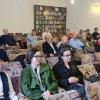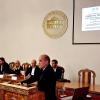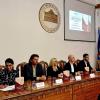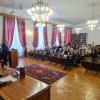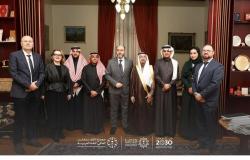Empire of the text: Tuḥfe-i Šāhidī and Its Use in Ottoman Bosnia” Scientific Monograph Promoted
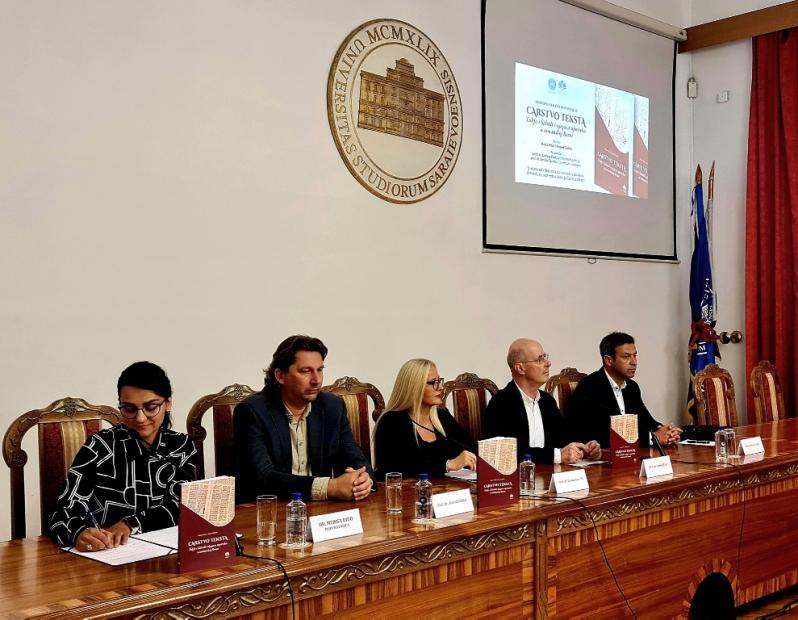
Organized by the University of Sarajevo, UNSA Faculty of Philosophy and the Gazi Husrev Bey Library in Sarajevo, the scientific monograph “The Empire of the Text: Tuḥfe-i Šāhidī and Its Use in Ottoman Bosnia” by Dr. Munir Drkić and Dr. Ahmed Zildžić, professors at the UNSA Faculty of Philosophy was promoted in the UNSA Rectorate’s Ceremonial Hall.
University of Sarajevo Rector, Prof. Dr. Rifat Škrijelj, noting that the title “Empire of text: Tuḥfe-i Šāhidī and its use in Ottoman Bosnia” suggests the treasure kept by Gazi Hursev-Beg's Library, thanked the director and employees for their dedicated work, as well as the authors of the monograph on the effort invested. With the very end of his mandate, he pointed out that even with the arrival of the new rector and management, the University of Sarajevo will remain dedicated to publishing and promoting such important publications.
On behalf of Gazi Husrev-Bey’s Library, Mr. Hamza Lavić, looking back on the successful collaboration with Prof. Dr. Munir Drkić and Prof. Dr. Ahmed Zildžić that brought forwards this monograph, and he pointed out that with this promotion, the Gazi Husrev-beg library continues its cooperation with the academic community, and at the same time, the tradition of gathering scientific and professional workers who deal with the cultural and general history of Bosnia and Herzegovina has been going on for almost a century. . He expressed his gratitude to the authors of this study who, with their expert skills, provided insight into the content of the preserved manuscripts of this Persian-Turkish dictionary, which he pointed out as an example and an invitation to other researchers of the local cultural heritage to find a true partner in Gazi Husrev-Bey’s Library as a platform for their scientific research projects.
The structure and content of the monograph “Empire of the text: Tuḥfe-i Šāhidī and Its Use in Ottoman Bosnia” was presented by Dr. Đenita Haverić, professor at the UNSA Faculty of Philosophy, also a reviewer. After an exhaustive analysis of the seven chapters, along with contributions from the oldest manuscripts of the Tuḥfe-i Šāhidī that are kept in the Gazi Husrev-Bey's Library in Sarajevo, she pointed out that the value of this book is evidenced by the fact that this is the first monograph that, through a clear and consistent methodological approach, brings relevant scientific conclusions about the dictionary “Tuhfe-i-Shahidi”, various aspects of its use and influence in the Ottoman Empire and beyond its borders, and especially in the area of Ottoman Bosnia. She concluded that this book, in terms of scope and multi-perspective research, represents an extremely valuable contribution primarily to lexicology and lexicography, but also to the history of the Bosnian language. In addition, its contribution to the cultural history of this area is immeasurable, which cannot be a negligible factor in assessing its value.
Dr. Ludwig Paul, professor at the University of Hamburg and a longtime collaborator of the author of this edition, chronologically presented the origin and development of the tradition of Persian lexicography and its distribution, with reference to the content, purpose and use of dictionaries used in the Ottoman Empire, as one of the most important centers of Persian lexicography.
On behalf of the author, Prof. Dr. Munir Drkić addressed the attendees and spoke about the specifics, function, and significance of this poeticized Persian-Turkish dictionary written for the purposes of learning the Persian language at the initial level, and about its wide spread in the peripheral parts of the Ottoman Empire, where its bilingual content was opposed to a third language, while why Bosnia was one of the key centers of Persian lexicography.
He emphasized the multiple significance of this dictionary for the local context: Tuḥfe-i Šāhidī served as a model on which the Turkish-Bosnian dictionary Maḳbūl-i 'ārif of Muhamed Hevaj Uskufi, the most important lexicographic source of the Bosnian language, would be created. An even more important fact is that on the margins of the preserved copies from the 17th, 18th and 19th centuries, which are kept in the Gazi Husrev-bey library in Sarajevo, there are written hundreds of words in the Bosnian language that students of madrasahs and similar educational institutions wrote down during their studies, which confirms that the educational process in Ottoman Bosnia, at least at the initial level, took place significantly also in the native Bosnian language, and not exclusively in Turkish or Arabic, thus the authors call into question the established opinion.
He also concluded that the collection of Gazi Husrev-Bey’s Library with 86 copies of this dictionary indicates that Bosnia was one of the most important centers of Persian lexicography in the Ottoman period.
At the end of his address, he thanked the promoters, collaborators in the preparation of this edition, and Rector Škrijelj for his very clear and undoubted many years of personal and institutional support.
The monograph “The Empire of the Text: Tuḥfe-i Šāhidī and Its Use in Ottoman Bosnia” traces the presence and use of Persian-Turkish vocabulary in the verse under the title Tuḥfe-i Šāhidī (1515). Created in the classical period of Ottoman culture, this work was used widely and beyond the borders of the Ottoman Empire. The text soon became a standard textbook of Persian lexicon and prosody in Ottoman madrasas, but also a starting reading for many European Persianists. As such, it was widely represented and often used in the area of Bosnia and represents a valuable source for researching the cultural history of this area.
In the first chapters of the book, the authors place this dictionary in the context of the development of early Persian lexicography and provide basic information about the life and works of its author, Ibrahim-dede Šahidi (1470–1550). This is followed by chapters on the structure and reception of Shahidi's dictionary and the presentation of the most significant commentaries in the Ottoman Empire. The second part of the book follows various aspects of the presence and influence of this dictionary in Ottoman Bosnia. Four out of five commentaries written by Bosniak authors are presented, and the connection between Šahidi's work and the first Turkish-Bosnian (Bosnian-Turkish) dictionary in the verse Maḳbūl-i 'ārif is analyzed. In the last chapter of the book, based on preserved manuscripts, the authors reconstruct the use of the Tuḥfe-i Šāhidī dictionary in Ottoman Bosnia from the beginning of the 17th to the end of the 19th century.





